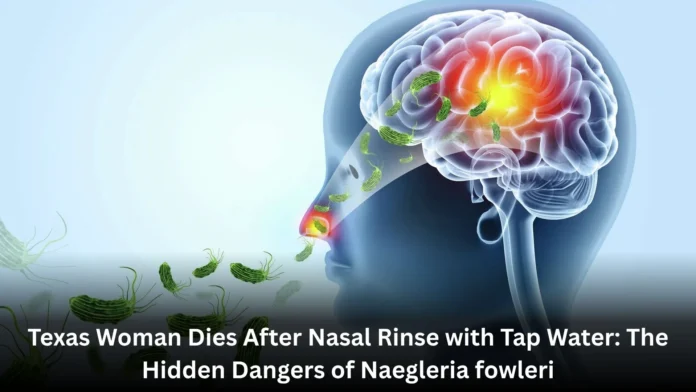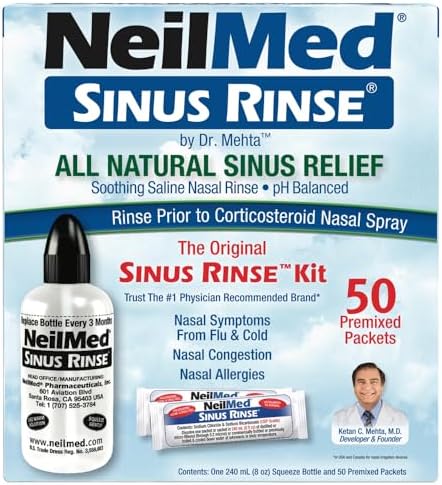A Tragic Reminder: The Hidden Dangers of Nasal Irrigation
What started as a simple routine for sinus relief ended in a heartbreaking tragedy. A 71-year-old woman from Texas, otherwise healthy and active, succumbed to a rare but devastating brain infection after using tap water from her RV’s water supply for a nasal rinse. The infection, caused by Naegleria fowleri, is as deadly as it is rare—and it’s something many people have never even heard of.
This incident is far more than a rare misfortune—it serves as a serious alarm bell. As natural remedies and DIY wellness routines grow in popularity, an increasing number of people are using neti pots and nasal rinses to manage allergies, colds, and sinus issues. However, this seemingly simple habit carries a hidden danger that many overlook.
What Is Naegleria fowleri and How Does It Kill?
Naegleria fowleri, chillingly dubbed the “brain-eating amoeba,” is a microscopic single-celled organism that thrives in warm freshwater environments—like lakes, rivers, hot springs, and even poorly maintained swimming pools. While harmless when swallowed, it becomes deadly when it enters the body through the nose.
Once inside the nasal passage, the amoeba can travel along the olfactory nerve to the brain, triggering a catastrophic infection known as primary amebic meningoencephalitis (PAM). The disease destroys brain tissue rapidly and often fatally.
Symptoms usually begin 1 to 12 days after exposure and include:
- Sudden, severe headache
- High fever
- Nausea and vomiting
- Stiff neck
- Seizures
- Hallucinations
- Coma
Sadly, once symptoms begin to surface, the disease progresses with alarming speed—often proving fatal within just five days. With a mortality rate surpassing 97%, timely awareness and preventive measures become absolutely vital for survival.
What Happened in the Texas Case?
In this specific case, the woman had been using a nasal irrigation device as part of her daily hygiene routine. However, instead of using sterile or distilled water, she used tap water from an RV campground water system. Just four days after her last rinse, she began to experience flu-like symptoms, followed by neurological signs of distress—confusion, seizures, and eventually coma.
Despite receiving medical attention and treatment for suspected infection, her condition rapidly deteriorated. Eight days after symptoms began, she died. Subsequent laboratory analysis revealed that her spinal fluid was infected with Naegleria fowleri, confirming the deadly amoeba as the cause.
This case highlights how something as seemingly harmless as rinsing your nose with untreated tap water can lead to fatal consequences.
Why Tap Water Isn’t Always Safe for Nasal Rinses
Most people assume that if water is safe to drink, it’s safe for everything else—but that’s a dangerous misconception. While tap water is generally treated for consumption, it’s not free of all microorganisms. The water can contain small amounts of bacteria and protozoa, including Naegleria fowleri, that aren’t harmful when swallowed but become dangerous if they enter the nasal cavity.
Boiling water kills these organisms, as does distillation and proper filtration. But untreated or improperly stored water—even from a municipal source—can still harbor deadly pathogens.
Safe Nasal Irrigation: What You Need to Know
If you regularly use a neti pot, squeeze bottle, or other sinus rinse device, you’re not alone. Millions find these tools effective for managing sinus pressure, allergies, and chronic infections. However, safety must always come first.

Here’s how to reduce your risk:
- Use Only Safe Water: For sinus rinsing, make sure to use distilled, sterile, or tap water that has been thoroughly boiled and then cooled—never use untreated water.
- Don’t Rely on Tap Water: Even clear tap water can contain harmful organisms. Do not risk using it without proper sterilization.
- Boil Water Properly: If you don’t have distilled water, boil tap water for at least one minute (three minutes at higher altitudes) and let it cool before use.
- Clean Your Device After Every Use: Wash and dry your neti pot or rinse bottle thoroughly to prevent bacterial growth.
- Store Equipment in a Clean Area: Avoid letting your rinse bottle or neti pot sit around wet or exposed to bathroom surfaces.
- Use Fresh Water Each Time: Never reuse water stored in open containers or saved from previous rinses.
Real-World Implications: Health Habits Need Informed Decisions
This tragic incident brings to light how a small oversight in a routine health practice can have irreversible consequences. While nasal irrigation offers legitimate health benefits—improving breathing, relieving congestion, and flushing out allergens—it’s vital to follow safe methods.
Many people unknowingly put themselves at risk, especially in warmer climates or when using water from non-standard sources like campgrounds, RVs, or private wells. Understanding the right techniques and taking the few extra steps to ensure safety can save lives.
Think It’s Only Natural Water Bodies? Think Again
While most Naegleria fowleri infections have historically been linked to swimming or diving in warm freshwater bodies, there have also been cases connected to splash pads, inadequately chlorinated pools, and even tap water systems in some regions.
You cannot, however, get this infection from swallowing contaminated water, nor is it contagious from person to person. The only known path is through the nose—making proper irrigation technique and water safety non-negotiable.
Final Thoughts: Awareness Can Save Lives
In a world where do-it-yourself health hacks are increasingly popular, this story reminds us of the critical importance of informed practices. The risk of Naegleria fowleri infection, while rare, is real—and usually fatal. But it’s also entirely preventable.
Using sterile water for nasal rinses, maintaining clean equipment, and staying educated about lesser-known health hazards can help you continue beneficial health routines—without putting your life at risk.
So the next time you reach for your neti pot or nasal spray bottle, ask yourself: Is the water I’m using truly safe?




